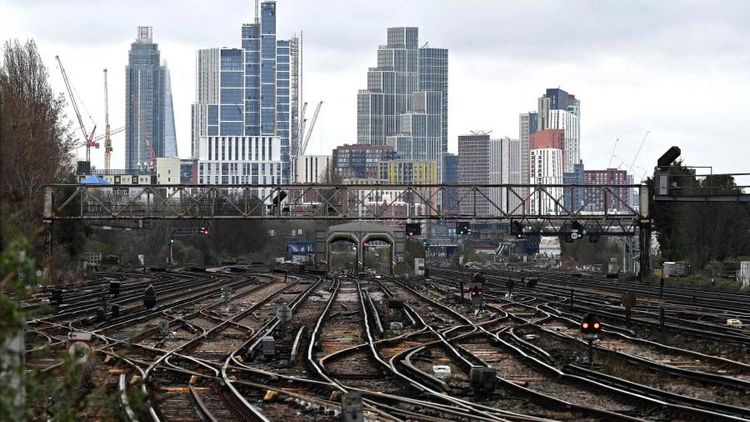Members of RMT union vote in favor of accepting pay offer from Network Rail.

The conflict between train operating companies remains unresolved, and it is expected that additional strikes will take place next week.
Philip Georgiadis and Delphine Strauss are currently located in London.
Navigate to the area where you can view and add comments to this article. You can also choose to print out a hard copy of this page.
Get free updates on labour disputes in the UK.
Receive a daily email called myFT Daily Digest updating you with the most recent occurrences in UK labour disputes every morning.
The RMT union's members have agreed to a salary proposal presented by Network Rail, bringing an end to one of the conflicts that has led to significant chaos across the UK rail network since the previous summer.
On Monday, the labor union declared that 76 percent of its members agreed to the suggestion of receiving a 9 percent salary increase over a period of two years. Those who earn less than others will have additional pay. However, they will only receive these benefits if they adapt to modern work practices.
The RMT's voting has marked the conclusion of the prolonged industrial action against Network Rail, and may bring about anticipation of additional agreements to tackle other railway industrial actions.
The union is in conflict with a set of train operating firms and intends to go on strike once more next week. At the same time, train drivers are having discussions with train firms in their own argument concerning remuneration, with no further strikes booked.
The general secretary of RMT, Mick Lynch, stated that the planned action against train companies for next week is still set to happen. However, he also mentioned that a resolution is achievable if the companies present an appropriate offer.
The Rail, Maritime and Transport Workers' Union (RMT) turned down a comparable 9% pay proposal for two years from the Rail Delivery Group, an organization that represents train operators, and expressed concern over multiple suggested changes such as the probable shutting down of numerous ticket offices.
The Secretary of Transportation, Mark Harper, expressed his satisfaction with the RMT's resolution to terminate their strikes at Network Rail. Nevertheless, he urged the union to cancel future strikes directed towards train operators and leave the decision up to members, just like they did with the infrastructure owner.
He expressed that although it is positive news, regrettably, RMT employees under train operating organizations are not receiving equal opportunity to resolve their disagreement.
However, the settlement of a minimum of one disagreement with the RMT, regarded as a union with a tough stance, offers a positive impact for the government as it aims to halt the series of strikes in the public sector of England, which was triggered by soaring inflation.
Last week, a number of health unions decided to endorse the offer made by the government regarding the pay of their members. This week, Health Secretary Steve Barclay is holding meetings with junior doctor unions in order to settle their own pay disagreement. Meanwhile, Education Secretary Gillian Keegan is having "intensive" discussions with unions that represent teachers.
The Public and Commercial Services union has been involved in a series of unresolved conflicts regarding the compensation, retirement funds, and employment protection for civil government employees. To address the unresolved issues, the union is increasing its strike activities.
According to the Public and Commercial Services union, the British Museum's workers will go on strike for a week during Easter, meanwhile, the British Library's staff will protest for two weeks. In addition, driving examiners and National Highways agency employees are also preparing to participate in additional strikes.
The PCS general secretary, Mark Serwotka, expressed that members are tired of always being given the least priority. Even though ministers have been negotiating with other areas of the public sector, they have not had any significant discussions with them.



















































